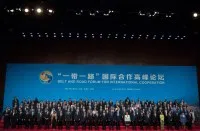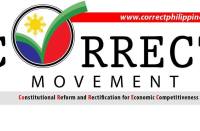On Monday, Philippine President Rodrigo Duterte will deliver the State of The Nation (SONA) address before Congress in what looks to be the most meaningful such address at least since 1987. While the anti-Duterte media are filling the web and television with hit pieces seeking to undermine Duterte’s record and question his popularity - the reality is that there is only one goal for this year’s SONA and it is one that will not only define the legacy of Duterte’s domestic policies but will also set the tone for the future of Philippine politics for generations to come.
Before Duterte are several proposals for much needed constitutional reform including the modest and frankly underwhelming proposals of the Consultative Committee (CC), more wide reaching pro-parliamentary proposals from the House Sub-committee, as well as PDP-Laban’s (Duterte’s political party) own proposals which are not dissimilar from those of the House Sub-committee.
While all proposals currently before the President and Congress advocate for a unitary state to be replaced by a federal Philippines, the most crucial difference between the CC’s proposals on the one hand and the Congressional/PDP-Laban proposals on the other is that the latter call not only for a strong federal system but for the replacement of the current presidential system with a hybrid parliamentary democracy.
As Duterte himself campaigned for the presidency on the promise of consecrating a federal-parliamentary system before he lives office, it is crucial that this promise is delivered in spite of the howls of his increasingly discredited opposition.
While a change in governance does not guarantee a change in the domestic, economic or international fortunes of a nation, what the last decades of history have shown is that the current system is not only unfit for purpose but far worse that than - its only purpose is to guarantee perpetual deadlock in which the egotistical triumph over the meritocratic and where oligarchic interests triumph over democratic interests.
Therefore, a system as different from the current one as possible becomes necessary in order to insure that there will be no going back to the days where political conflict dominates debates, thereby leaving little room for active problem solving measures.
A strong federal system will pave the way for the end of trickle-up economic growth which has seen Imperial Manila benefit from the collective economic revitalisation of the nation while more distant regions remain poor. Likewise, Duterte’s own record of affirmative localism in tackling crime, including narco-terrorism can be applied directly to new federal units whose leaders will be aware of the specific problems holding back the social development and collective peace of their local populations.
But while federalism is crucial to making the Philippines and more equal society, without a parliamentary system at a national level, young generations of Filipinos will be cheated of their great potential and moreover, will be cheated of the future they deserve.
A parliamentary system would erase the deadlock built into the current system by allowing a head of government (prime minister) to form a government that reflects his or her democratic popularity throughout the nation beyond any reasonable doubt. If the members of parliament who are answerable directly to their constituents are then pressured by a dissatisfied nation to propose a motion of no confidence in a failed head of government, a new government can be formed and/or new elections can be held in order to give the people a chance to correct the mistakes of their leaders at the moment they see fit rather than at the moment arbitrary term limits dictate. Beyond this, in the event that no one party wins a majority, coalitions can be formed to ensure reasonable compromise that accurately reflects the mood of a nation unable to unite around a single policy platform.
Furthermore, by having the leaders of government and opposition facing each other on a daily basis in intense debate on the issues of the day, such a system can help to weed out career politicians hiding behind slogans or sleek campaigns funded from a variety of sources, including those abroad. This is the case because in a parliamentary system, one stands and falls by one’s ability to defend a political position or set of policy proposals in front of one’s colleagues and the opposition. This will force both governing and opposition politicians in the country to become more familiar with the issues at hand as they will be put to the test on a regular basis.
When one excludes the international superpowers which themselves have highly unique histories and social dynamics, the countries in the world that tend to rank highest on the human development index have strong parliamentary rather than strong presidential systems. According to the United Nations Development Program, the top 10 countries (the presidential US and parliamentary Canada are tied at 10th) in terms of the human development rating are all governed by parliamentary systems.
What this demonstrates is that the meritocratic tendencies, transparency and malleability of a parliamentary system has a clear record of success in both continuing to elevate standards in developed countries while in Singapore in particular, such a system transformed a country with no natural resources from third to first world status in around 15 years.
South east Asia’s most successful country Singapore was built around a parliamentary system while in economically surging Malaysia, a federal-parliamentary system has allowed a new history making coalition to form a government led by respected political veteran Dr. Mahathir Mohamad. This demonstrates that a parliamentary system is effective in south east Asian countries near to The Philippines as well as some of the most economically successful and socially cohesive states across the wider world. It also shows that while arbitrary term limits can restrict the democratic will of the people by prohibiting a popular leader from remaining in office, in a parliamentary system, one’s leadership is directly related to his or her ability to fight and win elections as the 93 year old Mahathir just did yet again in Malaysia even after years out of office.
Taken in totality, if a federal system designed to ease profound regional inequalities was combined with a parliamentary style of government to help end a system designed to create deadlock and replace it with a system that can get things accomplished in a more expedited fashion, The Philippines stands a real chance of accelerating its already strong economic growth on a sustainable long term model, while insuring that the wealth does not get clogged in one particularly area either due to poor governmental management or due to poorer regions lacking the political infrastructure necessary to develop a strong economic infrastructure.
By no means will any new political system immediately change the mentality of the current crop of politicians who with few exceptions leave much to be desired. However, a federal-parliamentary system will allow for President Duterte to leave a legacy to future generations that are inspired to elevate the condition of the country based on the reformist zeal that Duterte has instilled within the nation. The alternative could signal a return to the old status quo that could undo all of the reforms that Duterte has instigated - thus making the Duterte revolution a footnote in history rather than a solid foundation upon which future generations can make crucial reforms in accordance with the will of the people.
The Philippines is faced with a variety of issues in 2018, but the most effective way to solve all of these problems in both the short and long term is through the rapid implementation of a federal-parliamentary system. If Duterte is able to convey the importance of this during his forthcoming State of The Nation - his already successful Presidency will have been the most successful in modern Philippine history.




